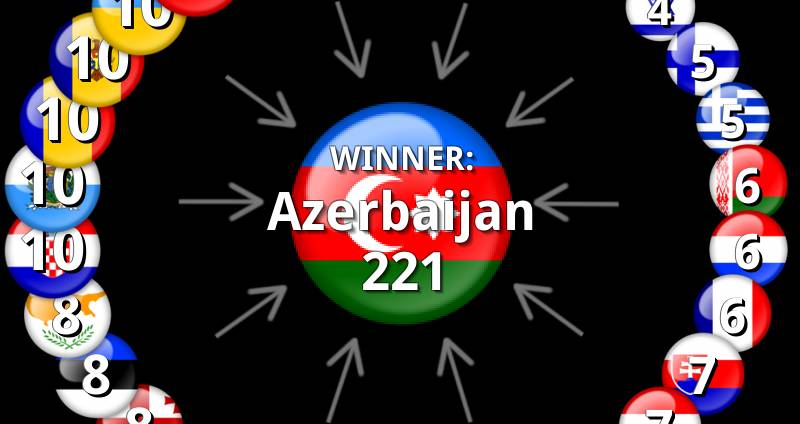Eurovision Voting: A Breakdown Of The Points Allocation Process

Table of Contents
The Two Voting Systems: Jury and Televoting
Eurovision voting relies on a dual system, ensuring a balance between expert opinion and popular choice: professional juries and public televoting. This combination aims to provide a comprehensive and representative reflection of audience preference.
Jury Voting
Each participating country appoints a jury of five music industry professionals – typically composers, musicians, and music journalists. These jurors are chosen to ensure a diverse range of musical expertise and prevent bias within Eurovision voting. Their identities remain confidential until after the voting process to maintain impartiality and prevent external influence.
The jury voting process involves each juror independently scoring each participating song from 1 to 8, 10, and 12 points. Crucially, no country's jury can award points to its own entry. The individual scores for each song are then aggregated to produce a single jury score for that country. Each country's jury scores are weighted equally in the overall calculation.
- Jurors score each song from 1 to 8, 10, and 12 points.
- No country can award points to itself. This prevents self-voting and ensures fairness in Eurovision voting.
- Each country's jury scores are weighted equally. This prevents any single country from dominating the jury vote.
Televoting
Public televoting allows viewers in each participating country to vote for their favorite songs. Voting is typically conducted via telephone, SMS text messages, or dedicated Eurovision apps. This element of Eurovision voting directly reflects the popularity of each performance among the general public.
The process involves aggregating the votes received from each country. Sophisticated systems are in place to prevent fraud and manipulation, including measures to detect and filter out duplicate votes from the same phone number or IP address. The aggregated televotes from each country are then weighted equally in the final calculation.
- Viewers vote for their favorite songs.
- Each country's televotes are aggregated.
- The system prevents duplicate votes from the same phone number or IP address, ensuring a fair reflection of public opinion in Eurovision voting.
Points Allocation and Announcement
Once both the jury and televoting scores are tallied, the points are allocated from highest to lowest for each country. The announcement of these points is a key part of the Eurovision Song Contest, building suspense and excitement. The scores are announced separately for the juries and the televotes, allowing viewers to compare the opinions of the experts and the public.
The "Douze Points" Factor
The awarding of "12 points" – the maximum score – is a highly anticipated moment in Eurovision voting. Receiving twelve points from a single country signifies significant popularity within that nation. The cumulative effect of receiving multiple "12 points" from different countries is often decisive in determining the winner. This is a key factor influencing the overall result, emphasizing the widespread appeal of the winning song.
- The 12 points are highly coveted and can significantly change the final ranking.
- Receiving multiple 12 points often indicates a strong performance and widespread popularity. This often signals a clear favourite in Eurovision voting.
Addressing Concerns and Controversies Surrounding Eurovision Voting
While the Eurovision voting system aims for fairness and transparency, concerns about political voting or "neighbourly voting" (countries voting for geographically close neighbours) have occasionally arisen. The European Broadcasting Union (EBU) actively works to mitigate these potential biases.
- The EBU implements measures to identify and counteract potential voting irregularities.
- Ongoing efforts focus on improving the system's transparency and robustness to ensure the fairness and integrity of Eurovision voting.
The Role of the EBU in Ensuring Fair Eurovision Voting
The European Broadcasting Union (EBU) plays a crucial role in overseeing the entire Eurovision voting process. They establish the rules and regulations, ensuring consistency and fairness across all participating countries. The EBU's involvement is vital in maintaining the integrity and reputation of the Eurovision Song Contest and promoting fair Eurovision voting practices.
Conclusion
The Eurovision voting system, while seemingly complex, is meticulously designed to balance expert assessment and public opinion. Understanding this points allocation process enhances the viewing experience, adding a layer of appreciation to the drama and excitement. By understanding how Eurovision voting works, you can fully engage with the suspense and anticipation of each announcement. So, next time you watch, you'll not only enjoy the spectacle, but you'll also understand the intricate process behind those crucial Eurovision voting results. Dive deeper into the rules and regulations surrounding Eurovision voting and become a truly informed fan!

Featured Posts
-
 Billy Ray Cyrus Et Nytt Kapittel Etter Skilsmisse Og Toffe Ar
May 19, 2025
Billy Ray Cyrus Et Nytt Kapittel Etter Skilsmisse Og Toffe Ar
May 19, 2025 -
 El Cne De Caracas Medidas De Seguridad De La Policia Nacional
May 19, 2025
El Cne De Caracas Medidas De Seguridad De La Policia Nacional
May 19, 2025 -
 World Cup Qualifying Norways Haaland Stars In Rout Of Moldova
May 19, 2025
World Cup Qualifying Norways Haaland Stars In Rout Of Moldova
May 19, 2025 -
 Grants And Loans For Eco Friendly Small Businesses
May 19, 2025
Grants And Loans For Eco Friendly Small Businesses
May 19, 2025 -
 You Tuber Jyoti Malhotras Pahalgam Visit Under Scrutiny Alleged Ties To Pakistan Before Terror Attack
May 19, 2025
You Tuber Jyoti Malhotras Pahalgam Visit Under Scrutiny Alleged Ties To Pakistan Before Terror Attack
May 19, 2025
